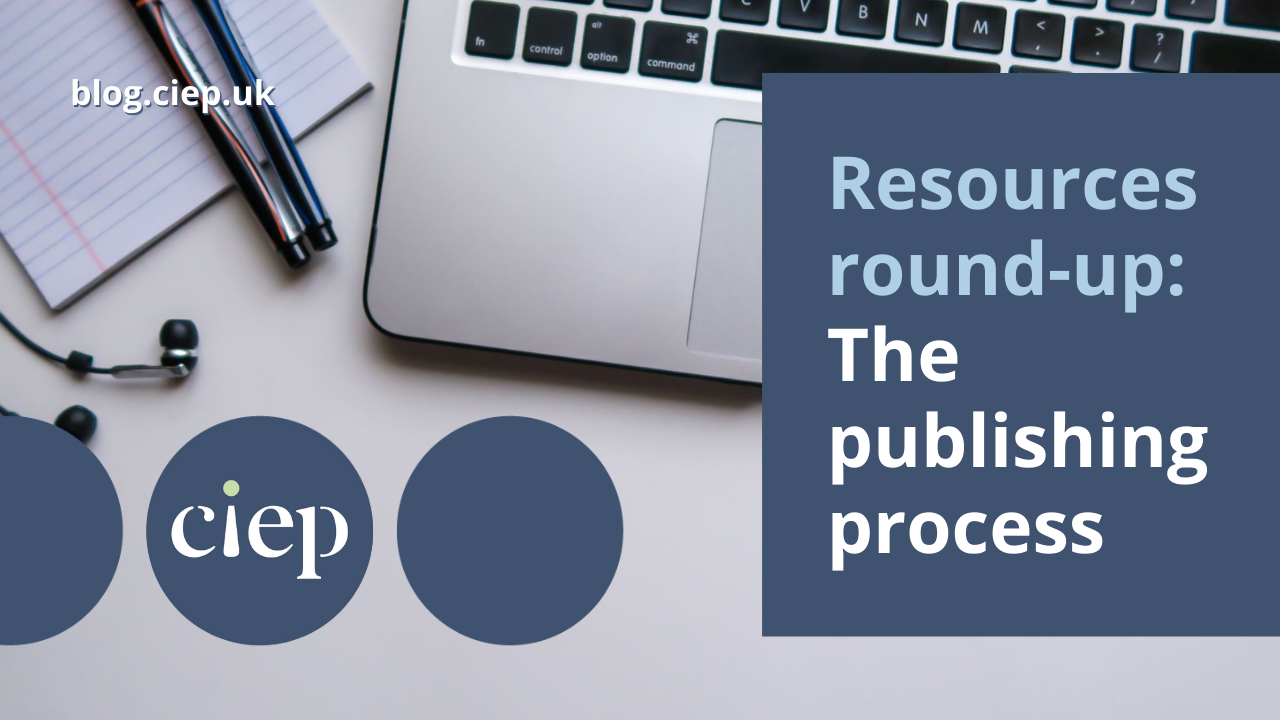Welcome to this round-up of resources compiled by the CIEP. This time, we look at how books are made. We have divided our picks into:
- Free resources from the CIEP
- Books
- Glossaries
- Articles
Free resources from the CIEP
Forgive us for leading with our own resources, but some of the free fact sheets on the CIEP’s practice notes web page provide a useful overview before we delve into the details of how books are made. ‘Anatomy of a book’, which describes the different parts of a book, is a good place to start. After that, you might want to explore the book-making process with ‘The publishing workflow’, supplementing that with the ‘Good editorial relationships’ infographic. Finally, ‘Proofreading or copyediting?’ covers which type of editing happens at different points in the creation of a book.
Books
These books aren’t free, but you can read free reviews of some of them by members of the CIEP, which might help you decide which are worth investing in.
Books about the publishing process
Two major editing and proofreading books – Butcher’s Copy-Editing (4th edn, Cambridge University Press, 2012) and New Hart’s Rules (2nd edn, Oxford University Press, 2014) – contain overviews of the publishing process. You might already have these volumes, so see what gems you can find within.
Inside Book Publishing by Giles Clark and Angus Phillips (6th edn, Routledge, 2019) covers the processes of traditional publishing in more detail. And to really dive into the subject, reach for the Oxford Handbook of Publishing, edited by Angus Phillips and Michael Bhaskar (OUP, 2019). Since this was reviewed by a CIEP member, a cheaper paperback version has been published.
If you’re coming to book production from a self-publishing point of view, the Writers’ & Artists’ Guide to Self-Publishing (Bloomsbury, 2020) could be helpful. Read the CIEP review for more.
The parts and people that make up the books
From a book’s blurb to its index, the different parts of a book have been explored in recent publications that are as entertaining as they are fascinating. For more recent bookish books, read our end-of-2022 round-up blog.
To add to these, get a copyeditor’s experience in The Subversive Copy Editor by Carol Fisher Saller (Chicago University Press, 2016), and hear from a lexicographer about how dictionaries are made in Word by Word by Kory Stamper (Pantheon, 2017).
Glossaries
Introducing ‘Publishing terminology explained’, Penguin Random House says: ‘Publishing shouldn’t be a mystery and that’s why we’ve pulled together an A–Z list of terms that we use in our business to help you navigate conversations and become familiar with how a publishing team operates.’ The CIEP has also written a free glossary of editorial terms.
Articles
Articles by and for the self-publishing industry excel in discussing how books are made. Recent examples include: ‘Why prologues get a bad rap’ by Tiffany Yates Martin on Jane Friedman’s website and ‘When should you have a table of contents and an index in your book?’, a TwitterChat run by the Alliance of Independent Authors (ALLi). You can rely on ALLi to really drill down to the intricate details that self-publishing authors might not realise they need to think about before the process starts.
However, one element that most authors will consider is the cover of their book. Cover designer Jessica Bell wrote articles recently on different aspects of this. For Jane Friedman, she discussed ‘The key elements of eye-catching book cover design’, and for ALLi she wrote about ‘Indie author book cover design: what works in 2022’. From ALLi you can also discover what really doesn’t work, in the TwitterChat ‘How a bad cover can ruin book sales’.
Last but never least is indexing. Indexer Geraldine Begley took to the AFEPI Ireland blog with ‘Indexing: An introduction for the curious’ which answers every question about indexing you can think of, including ‘Can’t a computer do that?’ (‘No’), and ‘Do I have to read the whole book?’ (‘Yes and no’). For anyone considering entering this interesting profession, or simply interested in what indexers actually do, this is indeed a great introduction for the curious.
 About the CIEP
About the CIEP
The Chartered Institute of Editing and Proofreading (CIEP) is a non-profit body promoting excellence in English language editing. We set and demonstrate editorial standards, and we are a community, training hub and support network for editorial professionals – the people who work to make text accurate, clear and fit for purpose.
Find out more about:
Photo credits: laptop and notebook by Maya Maceka on Unsplash, bookshop by Alican Helik on Pexels.
Posted by Belinda Hodder, blog assistant.
The views expressed here do not necessarily reflect those of the CIEP.




